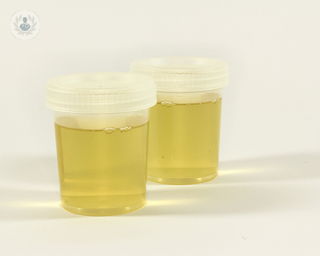Kidney infection
What is pyelonephritis?
Kidney infection, or pyelonephritis is a condition that causes one or two kidneys to become infected, resulting in inflammation. The infection first affects the lower urinary tract - usually the bladder - and then the kidneys, as it moves upstream.
It can be of two types:
- Acute: it is sudden and severe, and caused by a bacterial urinary tract infection (UTI).
- Chronic: it is rare, and more serious than the acute form. It is due to congenital anomalies that hinder the normal emptying of the renal collecting tubules, and recurring acute pyelonephritis.
Pyelonephritis is a serious condition that can cause permanent damage to the kidneys or a life-threatening infection, if bacteria spread to your bloodstream. Seek medical attention immediately if you experience any symptoms.
What are the symptoms of pyelonephritis?
The main symptoms of pyelonephritis usually appear within hours after infection. They are:
- Low back pain
- Fever
- Shaking chills
- Lack of appetite and malaise
- Nausea and vomiting
- Frequent urination
- Pain when urinating
- Cloudy urine with strong odour
- Presence of blood or pus in the urine
Symptoms vary depending on age. Children and elderly people may experience different symptoms to people in other age groups.
Very young children, for example, may not feel pain when urinating and only have a high fever, while elderly people might not have any of the usual symptoms. Instead, elderly people might experience confusion, hallucinations, or problems with speech.
How is pyelonephritis diagnosed?
Diagnosis principally involves taking a urine sample which can be tested for bacteria or blood in your urine. You may also have a blood sample taken – again, to check if there are bacteria or other pathogens in your blood that could be causing the infection.
Other common tests include a kidney ultrasound, a CT scan to see if there is a blockage, and a type of X-ray called a voiding cystourethrogram (VCUG), to get an image of the bladder.
What are the causes of pyelonephritis?
In the case of chronic pyelonephritis, the cause is usually a severe anatomical abnormality at birth. However, it can also be an acquired condition if you have a flaccid bladder due to spinal cord injury.
Acute pyelonephritis occurs as a result of a urinary tract infection, when bacteria enter the body through the urethra. Risk factors include:
- Having a weakened immune system
- Having diabetes
- Using a urinary catheter
- Being female, as the urethra is shorter in women than in men
- Having a structrual irregularity in your urinary tract that blocks, slows down, or changes, normal urine flow. For example, if you have an enlarged prostate gland
- Having frequent bladder infections
- Being pregnant
- Having nerve damage around the bladder
- Having vesicoureteral reflux (VUR), which is a condition in which urine flows from the bladder back into the ureter and kidneys
An infection from somewhere else in the body can also spread bacteria through the bloostream to the kidneys. For example, an artificial joint that is infected.
In some cases, kidney infection may develop after kidney surgery if bacteria enter the body during the intervention - but this is rare.
Can pyelonephritis be prevented?
You can help prevent urinary tract infections by:
- Drinking plenty of water through the day
- Avoiding the usage of douches in the genital area
- Going to the toilet as soon as you need to
- Emptying the bladder after sex
- Wiping from front to back after a bowel movement
How is pyelonephritis treated?
Treatment for pyelonephritis aims to reduce the infection and the acute symptoms. The first line of treatment is the prescription of antibiotics, and this should normally improve the symptoms within a few days. Painkillers can also be prescribed.
Intake of antibiotics may also be extended to a week or more, to clear the infection completely and prevent it from returning. The bacteria may be resistant to some antibiotics, but not to all of them. Your doctor will know which ones will work best for you after examining your urine and blood samples.
Most patients who are diagnosed and treated early, will feel better within two weeks of taking antibiotics.
In the case of a severe kidney infection, or if you are vomiting repeatedly, you may need to take intravenous antibiotics and fluids in hospital. The duration of your hospital stay will depend on the severity of your condition.
Finally, in the case of chronic pyelonephritis or the infection returning despite antibiotics, scarring of the kidney can occur over time, so you may need to see a nephrologist (a kidney specialist) to discuss the option of repairing the kidney with surgery.
Pyelonephritis can be physically tiring, even if you're fit and in good health. You might need up to two weeks of rest before you're well enough to return to your daily activities.
What is the difference between a UTI and pyelonephritis?
A UTI is the inflammation of any part of the urinary system (the bladder, the urethra, the ureters, and the kidneys) commonly by a bacterial infection. Most UTIs occur in the bladder and the urethra, which is the lower urinary tract. If the bacteria remain in the bladder, for example, then it becomes a bladder infection.
Pyelonephritis occurs when bacteria travels to one or both kidneys, after a UTI goes untreated. Cases of pyelonephritis are rare, and it is estimated that only one in every 830 people will develop a kidney infection each year in the UK.














